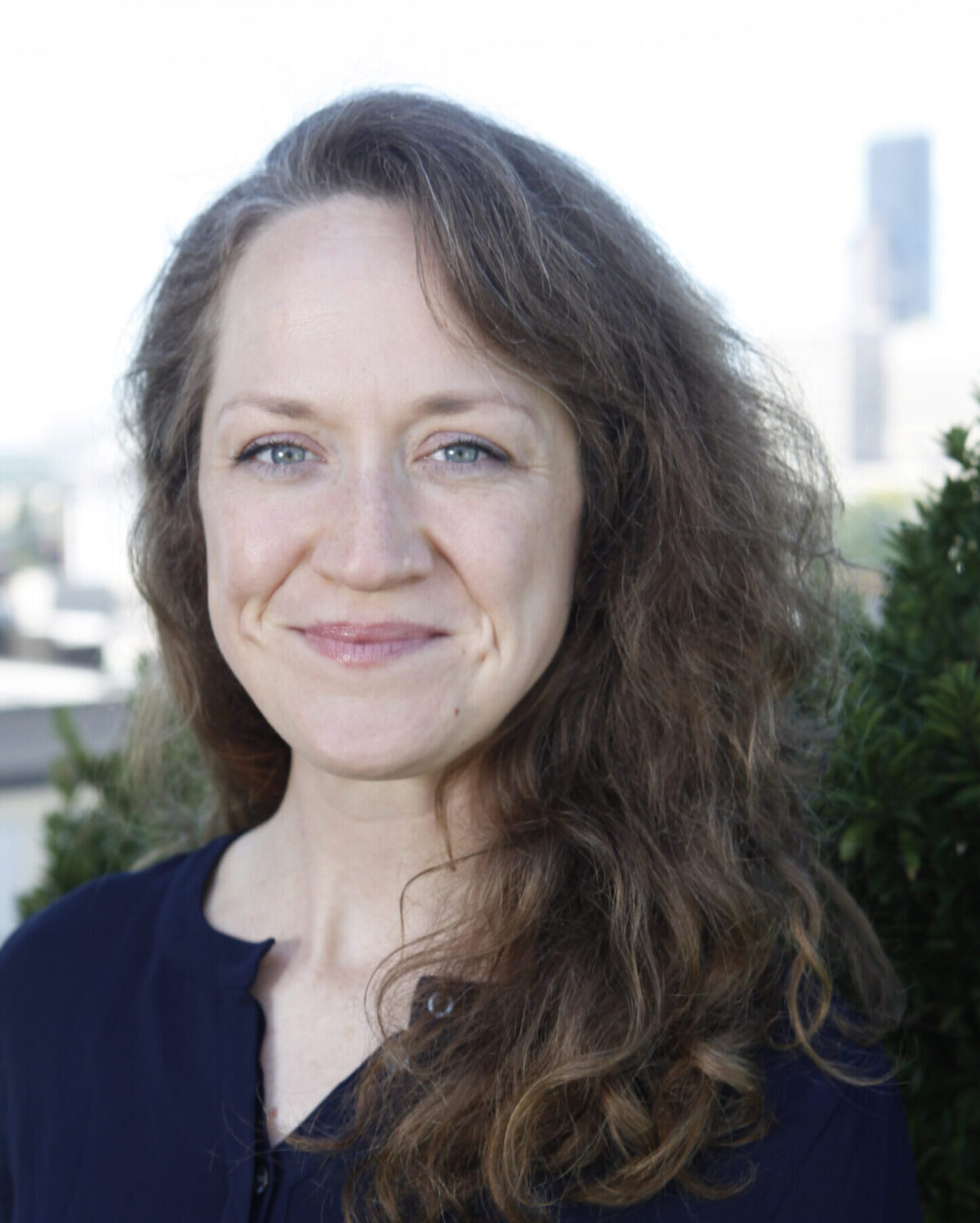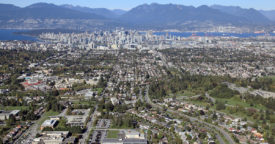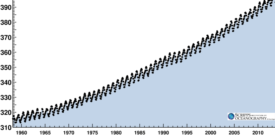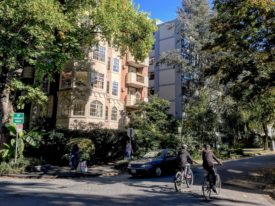Alan
Another reason to fix the filibuster, beyond reducing obstructionism, is that it will be a step toward fixing the Senate more generally: “The power of the smaller states is large and growing. Political scientists call it a striking exception to the democratic principle of ‘one person, one vote.’ Indeed, they say, the Senate may be the least democratic legislative chamber in any developed nation.”
Canada’s James Hansen is Sightline friend Mark Jaccard: the ultimate insider who has followed his climate knowledge and his conscience across the line into civil disobedience. He has written a detailed account of the treachery and fecklessness of Canada’s leaders—the decisions that pushed him to join others in blockading a coal train with his body. Here’s how he begins:
The man accompanying me smiled.
“Good for you, sir.”
“Thanks. I appreciate your saying that.”
“They’re trying to build a coal mine near my parents’ place on Vancouver Island. We’ve got to stop this.”
“Yes, we do.”
“Now, watch your head, sir.”
With his final comment, the young policeman gently guided me into the paddy wagon—a difficult manoeuvre with my hands cuffed behind me.
Eric
If you have a young child, this is mandatory viewing: photos of kids around the world with their favorite toys. I found clicking through the pictures to be a surprisingly emotional experience, in part because of the tremendous wealth disparities in evidence, but I think more because of the intrinsic awesomeness in the way that children play. (A couple of photos are a bit concerning though.)
On a more quotidian level, I wonder why little red cars are so prevalent. Having been once called “a general in the war on cars” by a prominent elected official, I find it ironic that my four-year-old son is as fixated on Lightning McQueen as any boy you can find. Why is that?
In further navel-gazing, I have a semi-irrational disdain for nutritional fads. So I enjoyed confirming my bias with Matthew Yglesias on the silliness of the Paleo diet. Human beings have, after all, been grinding and cooking grain for something like 30,000 years, so it’s not exactly a novel ingredient in our diets. (Anyhow, I can understand the attraction to diets based on obviously long-lived and healthy people, such as the Mediterranean diet. But taking up the eating habits of people who only lived 20 or 30 years?)
My award for best quote of the week goes to Senator Doug Ericksen (R-Ferndale) who said, upon passing Governor Inslee’s important bill to evaluate the effectiveness of state climate policies, “I want to take the religion out of carbon.”
That’s such a refreshing perspective, particularly for the right-hand side of the aisle, that I want to shout “amen, brother!”—just as long as that doesn’t violate the spirit of his sentiment.
Louisa Galassini takes a good look at the mismatch in federal spending between highways and rail service.
To bolster both sustainability and the resilience of infrastructure, there’s a new “drink local” movement afoot. It’s about water, not beer, and it aims to channel investments into local solutions for water supply and capture.
I’ll finish with a short therapy session for myself. Reading the ever-more dire tolling and traffic diversion scenarios for Seattle’s deep-bore tunnel, I wanted to bang my head on my desk.
I can’t help myself. I have to say it: we told you so. Again, and again.
Serenity now, serenity now, serenity now.
Anna
I was sobered by Katherine S. Newman’s examination of particularly regressive tax policy in states in the South and West where lawmakers are doing away with credits for the lowest income families. Her research shows that—all other factors aside—the more the poor are taxed, the worse off they are, whether they’re working or not. She says not only do those in poverty stay locked in the cycle, “we all pay a huge price for this shortsightedness,” especially the states in the Northeast and Midwest with more progressive tax policies which wind up footing the bill for their southern and western neighbors’ federal benefits:
It turns out that after factoring out all other explanations—like racial composition, poverty rates, the amount spent on education or health care, the size of the state’s economy, existing inequality levels, and differences in the cost of living—the relationship between taxing the poor and negative outcomes like premature death persisted. For every $100 increase on taxes at the poverty line, we saw an additional 7 deaths and 78 property crimes per 100,000 people, and a quarter of a percentage point decrease in high school completion. They have less money to buy medication, so their health problems get worse. High sales taxes make meals more expensive, so they shift to cheaper, unhealthy food. If people can’t make ends meet, they may turn to the underground economy or to crime. This self-defeating pattern has plagued the citizens of the “meaner states,” the ones that tax poor people at a higher rate, for a long time.
Newman insists there’s a better way. Those who’ve benefited the most from our public systems and structures have the responsibility to pay more—because they can afford it. The families in poverty simply can’t shoulder such a large share.
I’ve been paying attention to the Yahoo-telecommuting saga as it unfolds, in part because I do some of my best work when I’m away from the office, and in part because I buy into the utopian dream of saved time and costs, reduced traffic and emissions, boosted quality of life, and renewed focus on home that telecommuting seems to promise. The question raised in this New Yorker post is whether Yahoo is “trampling on the future” (that utopia) by banning telecommuting, or whether they making a terribly shrewd move.
The thing is that most studies of telecommuting focus on how working from home affects employees. Less often examined is how telecommuting affects employers, and “the research on this suggests that for Yahoo the costs of telecommuting dwarf its benefits.”
On the simplest level, telecommuting makes it harder for people to have the kinds of informal interaction that are crucial to the way knowledge moves through an organization. The role that hallway chat plays in driving new ideas has become a cliché of business writing, but that doesn’t make it less true. John Seely Brown, an organizational guru who was the director of the Xerox PARC research center for a decade, told me, “Those chance encounters that become evocative turn out to be incredibly important. They allow people to get out of their ruts and think about things that they might otherwise have missed.”
And here’s Sightline friend, Eric Liu on how the Millennial generation may lead the US out of political gridlock with fresh attitudes about the size and shape and role of government:
What might seem like inconsistency is in fact the germ of a pragmatic, coherent philosophy: government should be big on the what and small on the how. Government can set great national goals — whether in early learning, health care, or clean energy — but then use its platform and funding power to catalyze bottom-up and peer-to-peer solutions that can come from outside government.
If Democrats want to maintain their electoral hold on Millennials they should start celebrating citizen-driven, non-governmental, networked ways to solve problems. And if Republicans hope to earn this generation’s vote they should start acknowledging that there are indeed great national endeavors that require the leadership and spark of an active state. Whichever party disrupts its orthodoxy fastest can win the core of the 21st century electorate. By setting off this kind of race to reimagine, Millennials might just save American democracy.
Clark
Patterns of human habitation, seen from an airplane. Thanks, Google Maps! And a bonus question: which one has the shortest average walking distance from house to house? (Answer: it’s the grid!)








